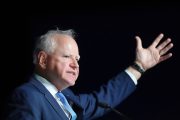The Republican Party looks set to adopt platform planks at the upcoming GOP national convention in Tampa to support an audit of the Federal Reserve and to call for a commission to study a return to the gold standard, according to news reports. Analysts had a range of reactions to the news, varying from excitement to disdain and disbelief.
Despite media claims that Republicans were seeking an end to centrally managed fiat currency and a return to gold-backed money, drafts of the platform revealed far less ambition. According to sources within the GOP cited in reports, the party is simply considering an inquiry into the possibility of re-establishing the tie between the U.S. dollar and the precious metal. What remained of the link was completely severed by President Richard Nixon in 1971.
After being signed into law by President Jimmy Carter, a previous gold committee examined the issue in the 1980s during the Ronald Reagan administration. Despite a vocal minority including Rep. Ron Paul (R-Texas) that dissented, the final recommendations advised against a return to gold-backed money to control wild inflation.
However, following decades of disastrous and unrestrained monetary gimmicks by the central bank, Republicans apparently want to re-examine the issue — or at least pretend to be concerned about sound money. And news reports indicated that the platform was all but guaranteed to include the new language.
“Now, three decades later, as we face the task of cleaning up the wreckage of the current administration’s policies, we propose a similar commission to investigate possible ways to set a fixed value for the dollar,” the draft platform says, according to a Republican National Committee official cited by Reuters. Final decisions on the exact contents of the GOP platform will be made next week.
Analysts said the language might be a nod to the decades-long efforts by Rep. Paul to restore honest money. The liberty-minded Congressman’s tireless quest was most recently highlighted during his term as chairman of the House Subcommittee on Monetary Policy, where he held multiple hearings on reining in the Fed, legalizing competition in currency, and more.
In recent years, Paul’s ideas have become increasingly popular and mainstream — at least among the general public, with more than 80 percent of Americans supporting an audit of the Fed. But true advocates of an honest monetary system were not entirely convinced about the GOP’s sincerity.
“In one sense, this is a tribute to Ron, and his endless efforts to educate us all about sound money, in the Austrian tradition,” explained Lew Rockwell, head of the liberty-minded Ludwing von Mises Institute and a former chief of staff to Rep. Paul. “He has been so successful with the people that the GOP sees a chance for another profitable lie.”
Rockwell was unimpressed by the overture, however. “In fact, of course, this plank is a bit of rancid cheese on the trigger to the rat trap that is the GOP,” he continued. “Still, if there is another gold commission, intended like the last one to promote fiat money and the Fed, may Ron [Paul] and Lew Lehrman get to write the minority report again. Their last volume is an enduring masterpiece.”
In an interview on CNBC, Rep. Paul himself did acknowledge that the GOP proposals may have been partly an effort to appease him and his legions of enthusiastic supporters, many of whom have so far refused to back presumed presidential nominee Mitt Romney. However, it is more than that, Paul added. “It’s a reflection of the effort we’ve had educating people about the return to gold,” he explained.
Reconsidering America’s increasingly flawed monetary system is also a good idea, according to Paul, who went to Congress after Nixon severed the dollar’s final, tenuous link to the precious metal. “We could avoid some of the horrendous swings in the marketplace with bubbles building and bursting and transfer of wealth from the middle class to the wealth,” he said.
Real solutions must be found soon, and the status quo will not suffice. “We’re deeply in debt and all that is being offered out of Washington is spend more money, borrow more money and print more money,” Paul concluded. “You can’t get out of a debt problem by creating more debt and printing more money.”
The other proposal being considered for the upcoming GOP platform is support for Rep. Paul’s “Audit the Fed” crusade. In the wake of the recent economic crisis, which saw the central bank secretly print trillions of dollars to shower on foreign and domestic financial institutions and governments, the bill was approved overwhelmingly by the House of Representatives yet again in July. It is currently being held up in the Senate by Sen. Harry Reid (D-Nevada).
Virginia Gov. Bob McDonnell, the chair of the platform committee, confirmed to reporters that the audit proposal had indeed been included. “It calls for an audit of the Federal Reserve on an annual basis, but it is very specific that it has to be done in a way with appropriate flexibility that it does not impair the independence of the Federal Reserve,” he explained. “Many of us believe that more sunshine more accountability of the federal government, and state government for that matter, is a good idea.”
Lawmakers involved in drafting the GOP platform, however, downplayed Paul’s influence on the consideration of the proposals. “These were adopted because they are things that Republicans agree on,” said Rep. Marsha Blackburn (R-Tenn.), who serves as the co-chair of the GOP platform committee. “The House recently passed a bill on this, and this is something that we think needs to be done.”
According to the Financial Times, which first broke the news about the gold standard plank, the Republican platform in 1980 mentioned the “restoration of a dependable monetary standard.” In 1984, the GOP expanded on the idea, adding that “the gold standard may be a useful mechanism.” More recently, however, the GOP platforms have failed to address the issue at all.
But following trillions in so-called “bankster bailouts,” wild money printing, and continued efforts to maintain a shroud of secrecy over the central bank and its operations, activists are speaking out. “There is a growing recognition within the Republican Party and in America more generally that we’re not going to be able to print our way to prosperity,” American Principles Project Chairman Sean Fieler, whose organization advocates a return to a gold standard, was quoted as saying.
FreedomWorks Vice President Russ Walker, who is also serving as a GOP delegate from Oregon, expressed support for taking up the issue as well. “We like the idea of looking at monetary policy and looking at what we call sound money,” he was quoted as saying by Bloomberg. Countless Tea Party activists have backed the plan, too.
A few opponents expressed concerns that returning to sound money could somehow contribute to depressions — adding weight to the arguments advanced by many sound-money advocates that the government should allow people to trade using whatever medium of exchange they prefer. Some opponents even falsely blamed the Great Depression on the gold standard despite the fact that even current Fed boss Ben Bernanke has acknowledged it was caused by the central bank and its policies.
Other critics of the monetary commission proposal worried that a return to the gold standard would remove the Fed’s ability to manipulate the economy, stripping some of its central-planning powers. Under gold, for example, the Fed would lose its monopoly control over the currency supply and its powers to bail out mega-banks at the public’s expense simply by creating new fiat dollars.
Hard money would also restrain government spending because the privately owned Fed would no longer be able to conjure unlimited amounts of currency into existence to fund perpetual runaway government deficits. The dollar, of course, has lost more than 95 percent of its value since the Fed was created in 1913.
Those are just some of the reasons the U.S. government should completely re-think monetary policy, advocates of sound money say. And the sentiment is catching on across America, with Utah recently legalizing gold and silver for use as legal tender. Numerous other states are considering similar measures as trust in the fiat dollar continues to plummet.
The GOP platform, of course, is non-binding. Virtually no analyst expects a Romney administration to seriously address the monetary problems that have plagued the U.S. economy for almost a century under the Federal Reserve System. However, the fact that the issues are even being discussed is a giant step forward, according to supporters.
Related articles:
The Best Way Back to a Gold Standard
Closing the Gold Window: Remembering the Nixon Lie 40 Years Ago
Forbes: Return to Gold Standard Within Five Years
Fed Manipulations in the Crosshairs
Romney Says He Would Replace Bernanke at Fed
Top Investor Warns of “Financial Armageddon” as Soros Dumps Bank Stocks, Buys Gold
Congress Debates the Federal Reserve: Reform or Abolish?
Led by Rep. Ron Paul, Congress Explores Sound Money
Gold, Silver Now Legal Tender in Utah
GOP Lawmaker Unveils New Effort to Rein in Fed
Fed Audit: Trillions For Foreign Banks, Conflicts of Interest
Rep. Paul’s Audit the Fed Bill Passes House, 327-98
RNC Continues to Undo Ron Paul Delegate Wins, This Time in Maine




